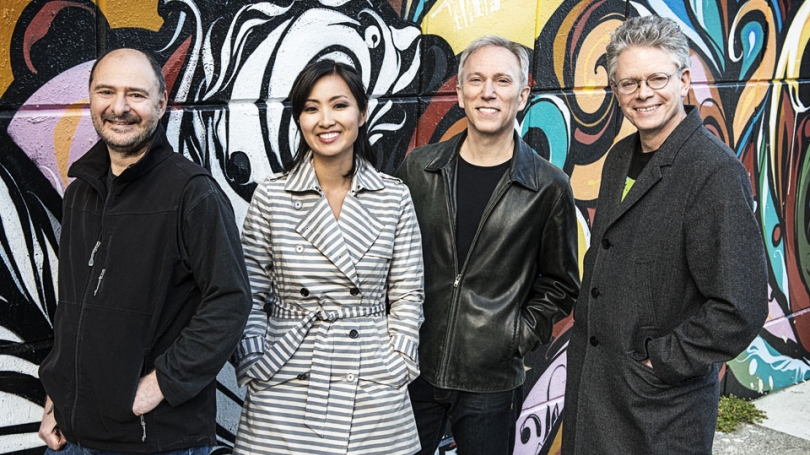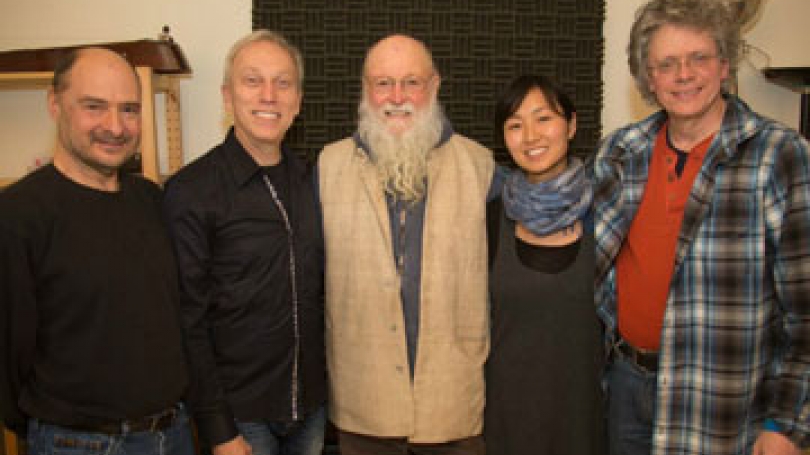Kronos Quartet: An Ardent Appreciation
A longtime fan of the Kronos Quartet looks back on the group's contributions and forward to its January 23 concert with composer Terry Riley.
The Kronos Quartet is coming! This news always fills me with a giddy, kid-in-a-candy-store sense of keen anticipation, and wonder.
I know I'll hear music I've never heard before. I'll be treated to a feast of new sounds, some of which will likely originate from musical cultures unfamiliar to me. I'll savor the delights of discovery, those magical moments in which one's sensibility is altered through encounters with the vivid unknown.
Since its inception, the Kronos Quartet seems to have been animated by a singular noble credo:
The world teems with extraordinary music.
Exquisite, galvanizing music is found in each culture of the world—including the folk, popular, sacred, "classical," and independent traditions of each.
We seek to discover, promote, and savor exemplary new musical work—and we trust that this process will be inspiriting and exhilarating for our audiences and us.
It is clear that the members of this estimable ensemble have been transformed by their extraordinary realization of this creed. In sharing the fruits of their pioneering odyssey, they generously offer us gifts of transformative revelation.
When I first heard Kronos' recording of George Crumb's Black Angels—a searing anti-war screed for amplified string quartet—my hair stood on end. And then I heard them do a fabulous arrangement of Jimi Hendrix's Purple Haze! Shortly thereafter I attended one of their first performances of Steve Reich's essential Different Trains (in which the composer soberly contrasts the transcontinental train rides he took as a boy with those very different train rides taken by children and adults during the Holocaust). By then I was wholly hooked; and since then, I've been repeatedly gobsmacked—by the group's recording of South African composer Kevin Volans' White Man Sleeps, by their collaborative concert with Inuit throat singer Tanya Tagaq, and by the uncanny, goosebumps-inducing sequence that unfolded at their last Hopkins Center appearance in 2015. In line with the Hop's yearlong exploration of Europe in World War I, the ensemble imagined collaborative projects they might have conjured in 1914-18; they interwove compositions by Ravel, Ives, Webern and Rachmaninoff among arrangements of work by a female Greek cabaret singer, a Turkish lute player, and Geeshie Wiley, a Mississippi blues singer. It was a stunning journey.
With its remarkable Fifty for the Future project, Kronos has commissioned a comparably wondrous array of composers to produce works that are being made available online for free—a vivid emblem of the group's dedication to supporting creative artists and exposing these artists' creations to the world. The fifty commissioned composers include:
Aftab Darvishi, a female Iranian composer
Islam Chipsy, an Egyptian keyboard player
Raven Chacon, a Native American composer
Fodé Lassana Diabaté, a Guinean balafon player
Hawa Kassé Mady Diabaté, a female griot from Mali
What a wonderful, tantalizing list of musicians! And there are 45 more!
And now the Kronos Quartet comes to Hopkins Center for a collaborative concert with Terry Riley, the pathbreaking American minimalist whose 27 commissioned compositions for Kronos blend a feverish heterodoxy with fine craftsmanship and improvisatory élan. From his early years as composer of both the seminal proto-minimalist In C and the ebullient, trippy Rainbow in Curved Air, Riley has undertaken a series of unusual sound adventures, along the way cultivating interests in Hindustani raga, jazz improvisation, alternative tuning systems, and non-traditional sound sources.
One highlight of the Riley-Kronos collaboration is the startling Sun Rings album. A NASA astrophysicist had collected unusual recordings made by "plasma wave receivers" of the sounds of outer space; the NASA Art Program (!) approached Kronos and invited the ensemble to incorporate these sounds into their music. Kronos in turn asked Riley to compose a piece for the quartet that incorporated these sounds. The result, an 85-minute work for string quartet, voices, and the recorded space sounds, is riveting and other-worldly, a sumptuous 10-movement sojourn in a mysterious yet congenial soundscape.
I don't know what pieces Kronos and Riley will bring to the Hop on January 23. Riley is bringing his son Gyan, a guitarist with whom he has presented numerous extended meditative improvisations at international venues; I trust the father-son collaboration will be incorporated into Terry's work for the quartet. I trust, too, that this concert will be scintillating—a bracing tonic, a salutary sonic adventure, an opportunity—as John Cage once delightfully put it—for renaissance.
A multifaceted musician with wide-ranging musical interests, Mark Nelson has over 30 years' experience teaching music and directing performing ensembles in schools, colleges, and communities. He currently teaches a series of music appreciation seminars at the Upper Valley Music Center; and he is Music Director of the Upper Valley Chamber Orchestra, the Upper Valley Community Band, the Lyme Town Band, and an a capella choir, Harmony Night. A devotee of new and experimental music, he has published articles on the music of Charles Ives, Béla Bartók, Ruth Crawford Seeger, and John Cage, and has composed numerous works featuring electronic media. With degrees in music composition/theory from Yale (B.A.) and Princeton (Ph.D.), and an education degree from Harvard (Ed.M.), he is deeply committed to promoting among ensemble members, audiences, and students the joys of musical discovery.

